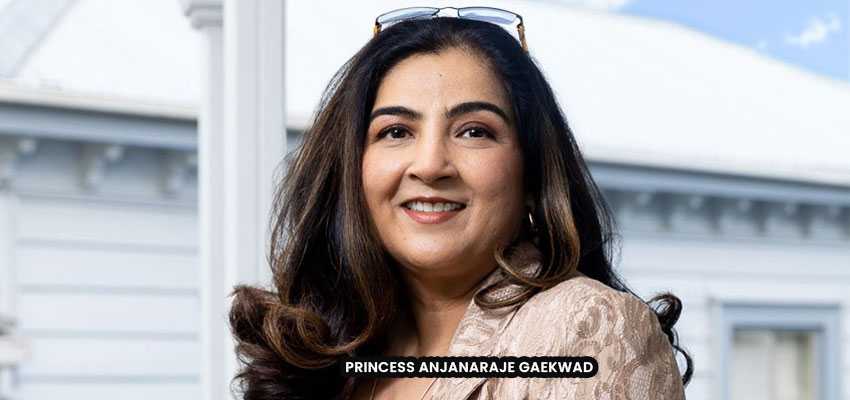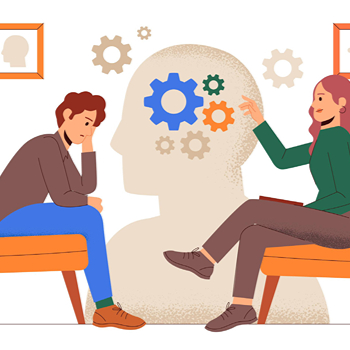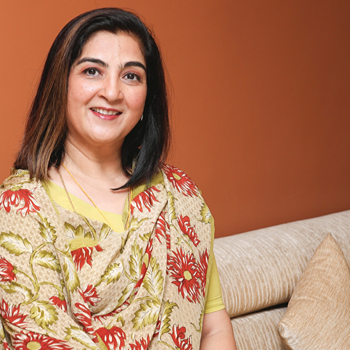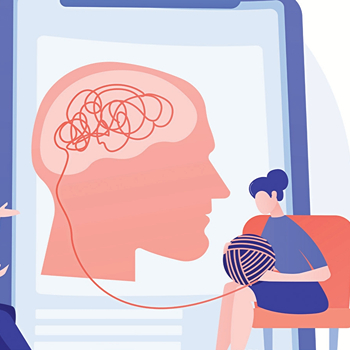ROYAL MISSION: An app for students’ mental health

Born into the illustrious Gaekwad royal family of Baroda, Princess Anjanaraje Gaekwad’s life was shaped not just by tradition, but by an unwavering commitment to service. Over the past three decades, she has carved an extraordinary path in the field of mental health—first as one of the few practising clinical psychologists in Gujarat, and later as a specialist in child and family therapy in New Zealand’s public health system. From founding a grassroots NGO for parents of mentally challenged children in the mid 1990’s, to launching PsychEd, a tech-enabled youth mental health service in India, her work is a blend of empathy, innovation and longview vision.
In her first-ever public interview, she opens up about how her royal upbringing shaped her worldview, what led her to pivot from crisis response to long-term mental wellness strategies, and why investing in the emotional infrastructure of India’s youth is not just urgent, but essential
Corporate Citizen: Congratulations on your new initiative, please tell us more about PsychEd App?
Princess Anjanaraje Gaekwad: PsychEd is a start-up I launched in April this year. It is a culmination of all my learnings over the years, personal and professional, and is rooted in a vision to build a service that delivers exemplary world-class psychological services to the youth of our country. PsychEd, a youth-focused, tech-assisted mental health platform built specifically for school and college communities, was born out of a simple idea: mental health should be proactive, not reactive, and that educational institutions must become safe spaces where emotional intelligence is taught, nurtured and modelled.
We have designed our programmes to work across the ecosystem — parenting workshops, student life skills sessions, teacher training modules, and one-on-one counselling support—each one tailored to the unique realities of Indian education system. Our approach blends clinical expertise with cultural sensitivity, using storytelling, games, digital tools, and reflective practices to spark meaningful engagement with young minds. We also offer 24/7 online psychotherapy, understanding that many teens and young adults wrestle with their toughest thoughts in the quiet hours of the night.
Perhaps, it is important to underscore here that we do not replace the work of school counsellors. On the other hand, we support, consolidate and extend the work that they do by taking relevant conversations from classrooms to families and communities.
CC: What differentiates PsychEd from other mental health services?
Our core strengths lie in accessibility, cultural relevance and clinical integrity. We are committed to providing high-quality, professional mental health support—we do not entertain mediocrity. Every element of our service is tailored to the needs of young people, including 24/7 online counselling and short-term solution-focused modules that are completely stigma-free.
Our counselling approach is culturally sensitive and inclusive. We’re open to integrating Indian traditions that promote well-being, such as Yoga, Pranayama and mindfulness, alongside evidence-based practices. Additionally, we’re building an AI-enabled triage system to ensure that each student is quickly and accurately matched with the therapist best suited to their needs.
"I want to be part of building a culture where seeking help is seen as courageous, not shameful; where mental health support is integrated seamlessly into schools and homes; where our systems are proactive, not just reactive"
— Princess Anjanaraje Gaekwad
CC: Is it a free service?

No, our model is business-to-business. Our modus operandi is to partner with educational institutions — schools, colleges and universities, to build and strengthen structures that foster and grow mental resilience and upskill our youth in emotional well-being. For too long, psychological services in India have been viewed as voluntary or supplemental. In my view, this has undermined the profession. It’s time we recognise the 7+ years of rigorous training psychologists undergo, and ensure their work is valued and fairly compensated.
CC: What’s your long-term vision for PsychEd?
The vision I hold isn’t just for PsychEd—it’s for our country, and for communities around the world. My deepest aspiration is to help build societies that are emotionally intelligent, capable of navigating change, transition, and adversity with resilience and grace.
If we can upskill our people to respond to life’s challenges with awareness and compassion, we can begin to break the cycles of trauma, disconnection and violence that hold us back. Only then can a rising of consciousness take place, where authenticity is honoured, and meaningful connection becomes the norm. PsychEd is merely a medium to serve that larger vision.
"It was a transformative period, personally and professionally in New Zealand. Working within a robust, well-funded mental health infrastructure exposed me to interdisciplinary collaboration, and long-term therapeutic planning—approaches that were often aspirational back home"
CC: Could you speak a little about your early work in India and how your family legacy shaped your social outlook?

The most life-defining legacies are often the ones we inherit—quietly and powerfully, from our families. When I reflect on my own inheritance, I can’t help but smile. Being the great-great-granddaughter of one of India’s most visionary rulers, Maharaja Sayajirao III, means that values like service, humility and diligence were non-negotiable. They were the lived language of our home. They were played out every day in the lives of the stalwarts who grew us up—my beautiful Rajmata Shantadevi Gaekwad, who spent afternoons regaling us with her memories of Maharaja Sayajirao III, and her experiences as the regent of Baroda state. My beloved parents, Late Maharaja Ranjitsinh and Rajmata Shubhanginiraje, and my loving aunt the Late Dr Mrunalinidevi Puar, Maharanisaheb of Dhar, who spent lifetimes in lending their time and energy in the socio-political upliftment of our city.
Every member of the family was engaged in different aspects of community participation and development. Family conversations around the dining table would go on for hours — animated discussions of local politics, educational organisations, art, culture, sports, hospital management, woman and child health, and environment. Growing up in that kind of atmosphere, where ideas and actions coexisted, shaped me profoundly. As a young girl, I couldn’t help but be emotionally stirred and inspired by the world I was immersed in.
I completed my schooling at St. Mary’s Convent School in Nainital. Pursuing my natural curiosity about people—their stories, their oddities, their varied responses, all presented as exciting pathways inviting further exploration—I went on to study Psychology at The Maharaja Sayajirao University of Baroda. The more I studied abnormal and clinical psychology, the more I wanted to study it and I finally did my professional training as an MPhil student at NIMHANS, Bengaluru. The two-year programme was both rigorous and deeply immersive. It was there that I not only developed strong professional skills, but also solidified my lifelong commitment to mental health as a transformative force in people’s lives.
CC: What prompted your shift from clinical, one-on-one work to a more preventative and macro-level approach?
The transition was a gradual, organic one. For much of my career, I worked at the micro or small group level, supporting individuals through crisis, trauma, and deeply personal struggles. That work has always been meaningful, but over time, I began to feel a growing discomfort—too many people were reaching the edge before they asked for help.
It felt like I was the ambulance waiting at the bottom of the hill—helping people after the fall, when so much of that pain could have been prevented. I began to ask: what if we could intervene earlier? What if we could equip people, especially the young, with the emotional tools and psychological literacy to build resilience before the breakdown? The aspiration was to help shape systems where mental health is nurtured proactively, not just repaired reactively.
CC: What kind of work did you engage in at the grassroots level?
After completing my training at NIMHANS, I returned to Gujarat, eager to contribute to a field that was still in its nascent stages within the region. At that time, mental health services were limited and public understanding was minimal. Being one of the few trained clinical psychologists, practising in the state was a huge responsibility that came with many sleepless nights. I found myself working across as many as 14 NGOs spanning a wide range of settings, from hospitals and schools to grassroots community organisations.
Much of my early work involved conducting assessments, writing diagnoses, and collaborating with multidisciplinary teams, to provide holistic support. However, I soon realised that true advocacy for these children couldn’t happen in isolation, their parents need to be supported and empowered first. Many families felt marginalised, overwhelmed and alone. So, on Sundays and after hours, I began holding informal gatherings, where parents could share their experiences and build a sense of connection. This eventually materialised into the formation of Sahaya, a parents’ association of differently abled children.
CC: Could you share a bit about your move to New Zealand and how your work evolved there?
In 2007, life led me to New Zealand, where I spent the next 18 years raising my children and expanding my work in child, adolescence, family and community, mental health. It was a transformative period, personally and professionally in New Zealand. Working within a robust, well-funded mental health infrastructure exposed me to interdisciplinary collaboration and long-term therapeutic planning—approaches that were often aspirational back home.
What struck me immediately was the clarity with which mental health was treated as a distinct domain. Something that, at the time, was still evolving in India. Children with mental health concerns had access to dedicated services and multidisciplinary teams. The structure itself was thoughtful and well-defined, with separate teams for early childhood and adolescent mental health. I began working with the child team, before expanding my work to include adolescents and families.
What made my time in New Zealand truly enriching was the diversity of the communities I had the privilege to work with. The country is home to a remarkably varied population— indigenous Māori and Polynesian families, refugees, immigrants from across Asia, Europe and the Middle East, each carrying with them layered stories of resilience, loss and adaptation.
Every clinical interaction was a reminder that cultural beliefs, migration journeys, intergenerational trauma and systemic inequities, all shaped how individuals and families experienced emotional distress, and how they sought healing. The work demanded not only professional expertise, but deep cultural humility and sensitivity.
Earlier this year, in March, I returned to India and now based at my ancestral home in Baroda. This return is not just geographical, it marks a new exciting season for me. I’ve come back with a renewed mission — to contribute to India’s mental health ecosystem in a more systemic, inclusive and preventative way.
CC: Was there a major cultural or professional difference between practising in India and New Zealand?
Absolutely. New Zealand was far more structured and ahead in terms of awareness, accessibility and professional development. The profession of psychology required accreditation and registration, thereby standardising the delivery of services. I trained further in family and systemic therapy, sponsored by the Health Board. I also worked in what they called Family Therapy Clinics— post work-hour services where a team of senior clinicians observed and directed therapy in real time from behind a one-way screen. That kind of experiential learning and peer supervision was invaluable.
We lack these structures in India, consequently causing a big disservice to the practice. Psychologists here appear to be treated synonymously with counsellors, lifeskill coaches and mentors. Citizens remain worried about confidentiality and being taken undue advantage of, as there are no ethical practices that are legally enforced. I remain concerned that vulnerable, mentally unwell people seek the support of individuals who are practicing well beyond their scope.
"We have designed our programmes to work across the ecosystem — parenting workshops, student life skills sessions, teacher training modules, and one-on-one counselling support—each one tailored to the unique realities of Indian education system"
CC: Did you eventually set up your own practice?

Indeed, I did. After working for six to seven years with the District Health Board in New Zealand, I started a private practice in Ponsonby, an upmarket suburb of Auckland.
It drew an affluent, high profile, international clientele, which brought with it unique cultural nuances to therapy. It stands out as a time in my life when I actually paused, consolidated my learnings, and practiced with a gentle competence, authenticity and assurance that had evolved from years of clinical and personal lived experience.
CC: What inspired you to return to India?
A growing restlessness to work beyond the confines of a clinic. A strong wish to work with upcoming young psychologists in India, and share with them the learnings and insights I had gathered over the years. Most importantly, a strong conviction that we have to engage, initiate and involve our youth in mental health interventions to start the difficult, but necessary conversations.
CC: What kind of legacy do you hope to leave behind through your work with PsychEd and beyond?
If there is one legacy I hope to leave behind, it is the idea that emotional well-being is not a luxury—it is a necessity, a fundamental right, and a shared responsibility. Through PsychEd and all the work that has led up to it, my goal is to help normalise conversations around mental health, particularly for the youth of our country. I want to be part of building a culture where seeking help is seen as courageous, not shameful; where mental health support is integrated seamlessly into schools and homes; where our systems are proactive, not just reactive.
I also hope to inspire young psychologists, educators and leaders, to think boldly, to innovate, collaborate, and stay rooted in both empathy and ethics. If PsychEd can pave the way for more thoughtful, inclusive and culturally attuned, mental health systems in India, then I will consider that a meaningful contribution.
CC: If you could say one thing to the young people of India struggling with their mental health, what would it be?
I would tell them — you are not broken, you are not alone. What you’re feeling is valid and there is help, there is hope, and there is healing.
Our culture often teaches us to suppress, to endure, to stay silent. In reality, struggling doesn’t make you weak, it makes you human. Reaching out for support is not a sign of failure, it’s an act of immense strength. Your mind, like your body, deserves care, attention and kindness.
Please don’t wait until things fall apart. Speak up. Seek help. Share your story. You are allowed to feel, to falter, and to find your way back. And most importantly, your life matters not just to you, but to a world that is better because you’re in it.